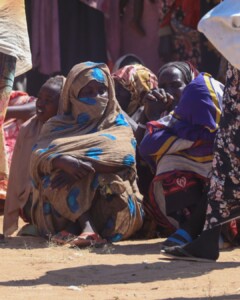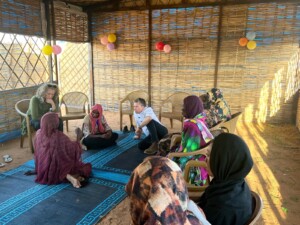Three million Sudanese children suffer from acute malnutrition
According to Sudan’s Ministry of Health and United Nations agencies, about three million children under the age of five in the country suffer from acute malnutrition.
The Health Ministry reported in a joint statement with the World Health Organisation (WHO), the World Food Programme (WFP), and the UN Children’s Fund (UNICEF) this week that according to WHO standards, acute and chronic malnutrition rates constitute “a serious public health concern”.
 A child is being weighed in Sudan (UNICEF, 2021)
A child is being weighed in Sudan (UNICEF, 2021)
According to Sudan’s Ministry of Health and United Nations agencies, about three million children under the age of five in the country suffer from acute malnutrition.
The Health Ministry reported in a joint statement with the World Health Organisation (WHO), the World Food Programme (WFP), and the UN Children’s Fund (UNICEF) this week that according to WHO standards, acute and chronic malnutrition rates constitute “a serious public health concern”.
A recent study showed that 36.4 per cent of the children under-five in Sudan are stunted (too short for their age) and 13.6 are wasted (too thin)*.
Only 62 per cent of the children under-five are exclusively breastfed, while the timely introduction of adequate complementary feeding is weak, with only 24 per cent receiving age-appropriate meals. At least 63 per cent of the children does not enjoy sufficient daily meals.
Suggestions to promote good nutrition for infants and young children during the COVID-19 pandemic include community awareness campaigns via mosques, and radio and television.
COVID-19 isolation centres should provide information on the needs of infants and young children. Lactating women infected with the coronavirus should continue breastfeeding while applying preventive measures to protect the infants. All other breastfeeding women must be encouraged to take the COVID-19 vaccine.
‘Stunting rates rise above 30 per cent in 128 out of 188 localities, making Sudan one of the 14 countries where 80 per cent of the world’s stunted children live’ – UNICEF
Underdeveloped
The Sudanese National Council for Child Welfare reported in July 2020 that the cognitive abilities of one in three Sudanese children are underdeveloped because of undernutrition.
More than 45 percent of Sudanese aged between 15 and 64 years suffered from malnutrition during their childhood.
Sudan has one of the largest numbers of malnourished children in the world. At least 2.7 million children under-five suffered from malnutrition in 2019. Nearly 700,000 children are suffering from severe acute malnutrition. “Stunting rates rise above 30 per cent in 128 out of 188 localities, making Sudan one of the 14 countries where 80 per cent of the world’s stunted children live," UNICEF states.
Inadequate dietary intake is one of several immediate causes of undernutrition in Sudan per year. According to the Sudan Multiple Indicator Cluster Survey (MICS) in 2014, on average only 15 per cent of young children aged 6-23 months were provided the minimum acceptable diet, primarily due to insufficient diversity of their diets although food frequency is also an issue.
* Stunted growth refers to low height-for-age, when a child is short for his/her age but not necessarily thin. Also known as chronic malnutrition, this carries long-term developmental risks. Wasted refers to low weight-for-height where a child is thin for his/her height but not necessarily short.











 and then
and then